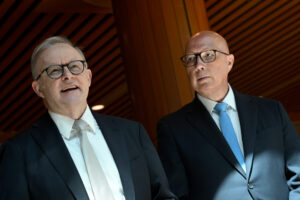By Richard Denniss, Chief Economist at The Australia Institute
[This article orininally appeared in the AFR]
If Malcolm Turnbull were serious about the cutting the company tax rate he would simply push for a carbon tax to fund it.
If the Greens didn’t support him, Labor almost certainly would. In one fell swoop he’d deliver the tax cuts he says we need, the carbon price he knows we need, plus leave the budget, and the public’s faith in our democracy, in a much better place. But he won’t.
The Business Council of Australia won’t push for such a simple set of self-funding reforms for the simple reason that the right of Australian politics is more concerned with politics than it is with policy. While a carbon tax is good for the climate and good for the economy, it is opposed by a small number of powerful players in the resource sector and the parliament.
If the BCA were serious about getting its company tax cuts through the parliament it would aim its fire at the coal companies and conservative climate sceptics that are holding them back. But history says Jennifer Westacott and the CEOs she represents would rather blame unions and environment groups than take on the powerful groups that really stand in the way.
Modern Australian politics revolves around interests, not ideas.
Indeed, while the Coalition are often described as “free marketeers” who support “small government” the facts suggest otherwise. Minister for Resources Matt Canavan wants to subsidise coal mines. Tony Abbott wants to nationalise power stations and Malcolm Turnbull wants the government to build Snowy 2.0. The Coalition are united in their desire to intervene in markets, they just can’t agree on when.
Neo-liberalism is dead in Australia, it was killed by the political right and the business community who couldn’t resist the desire to subsidise their friends and tie their opponents up in the red tape they claim to despise. When it comes to unions, charities and the renewable energy industry it seems too much regulation is never enough for the modern right.
While faith in “free markets” had been dying a slow death for decades the mortal blow was delivered by Tony Abbott’s populist campaign against the carbon and mining tax.
Abbott has a well earned reputation for tearing things down but he is yet to receive due credit for the scale of his destruction. He didn’t just wreck the neo-liberal policy tools of carbon taxing and resource taxing, he wrecked the capacity of business groups to rely on economic modelling and economic experts to drive unpopular reforms through a reluctant public or parliament.
But, despite Abbott’s success in destroying the public’s faith in experts and modelling, the Turnbull government and the BCA press on with their strategy of wheeling out economic reports and men in suits, day after day, to persuade a sceptical public that the best way to help boost wages is to give a tax cut to multinational companies. It shouldn’t take a year of opinion polling for them to figure that out, thanks to Abbott, they have no chance.
So, here we are in 2018, 11 years since John Howard and Kevin Rudd agreed we needed to introduce a carbon price and stuck in a dead end debate about the need to cut company tax rates. We can either have another decade of tedious trench warfare or we cut through with a circuit breaker in which all sides give something and all sides get something.
Any neo-liberal economist will tell you that a carbon price plays a role in reducing greenhouse gas emissions and that taxing things you want less of increases economic efficiency. And while many in the union and environment movement are opposed to a cut in the company tax rate, that hostility is not based on maintaining the existing tax rate but avoiding the future spending cuts that will inevitably accompany a big reduction in tax revenue.
So if the Turnbull government and the BCA really want the company tax cut, really believe in budget repair, and really believe in climate change, the path forward looks obvious. But because interests trump ideology in Australia I wouldn’t hold your breath. In Australia today appeasing the coal industry and the conservative climate sceptics is a more pressing problem than tackling climate change and cutting the company tax rate.
Richard Denniss is chief economist at The Australia Institute. His Quarterly Essay, Dead right: How Neoliberalism ate itself and what comes next, is available now.
Between the Lines Newsletter
The biggest stories and the best analysis from the team at the Australia Institute, delivered to your inbox every fortnight.
You might also like
Who’s going to stand up and make Nazis ashamed again?
A “March for Australia” rally sounds benign, but people who plan to attend the “March for Australia” rallies around the country on Sunday will almost certainly be marching alongside white supremacists and neo-Nazis.
As fascism rears its ugly head, we are trapped between the craven and the unwilling
Let’s take a bit of a look at responsibility shall we?
5 ways and 63 billion reasons to improve Australia’s tax system
With a federal election just around the corner, new analysis from The Australia Institute reveals 63 billion reasons why our next Parliament should improve the nation’s tax system.



